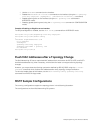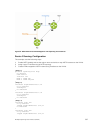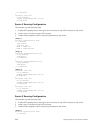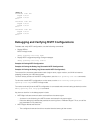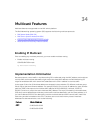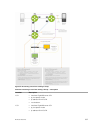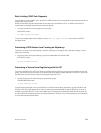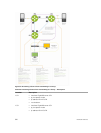
Protocol Ethernet Address
RIP 01:00:5e:00:00:09
NTP 01:00:5e:00:01:01
VRRP 01:00:5e:00:00:12
PIM-SM 01:00:5e:00:00:0d
• The Dell Networking OS implementation of MTRACE is in accordance with IETF draft draft-fenner-
traceroute-ipm.
• Multicast is not supported on secondary IP addresses.
• Egress L3 ACL is not applied to multicast data traffic if you enable multicast routing.
First Packet Forwarding for Lossless Multicast
Beginning with the Dell Networking OS version version 8.3.1.0, all initial multicast packets are forwarded
to receivers to achieve lossless multicast.
In previous versions, when the Dell Networking system is an RP, all initial packets are dropped until PIM
creates an (S,G) entry. When the system is an RP and a Source DR, these initial packet drops represent a
loss of native data, and when the system is an RP only, the initial packets drops represent a loss of register
packets.
Both scenarios might be unacceptable depending on the multicast application. Beginning with the Dell
Networking OS versions noted here, when the system is the RP, and has receivers for a group G, it
forwards all initial multicast packets for the group based on the (*,G) entry rather than discarding them
until the (S,G) entry is created, making Dell Networking systems suitable for applications sensitive to
multicast packet loss.
NOTE: When a source begins sending traffic, the Source DR forwards the initial packets to the RP as
encapsulated registered packets. These packets are forwarded via the soft path at a maximum rate
of 70 packets/second. Incoming packets beyond this rate are dropped.
Multicast Policies
The Dell Networking OS offers parallel multicast features for IPv4.
IPv4 Multicast Policies
The following sections describe IPv4 multicast policies.
• Limiting the Number of Multicast Routes
• Preventing a Host from Joining a Group
• Rate Limiting IGMP Join Requests
• Preventing a PIM Router from Forming an Adjacency
• Preventing a Source from Registering with the RP
604
Multicast Features



